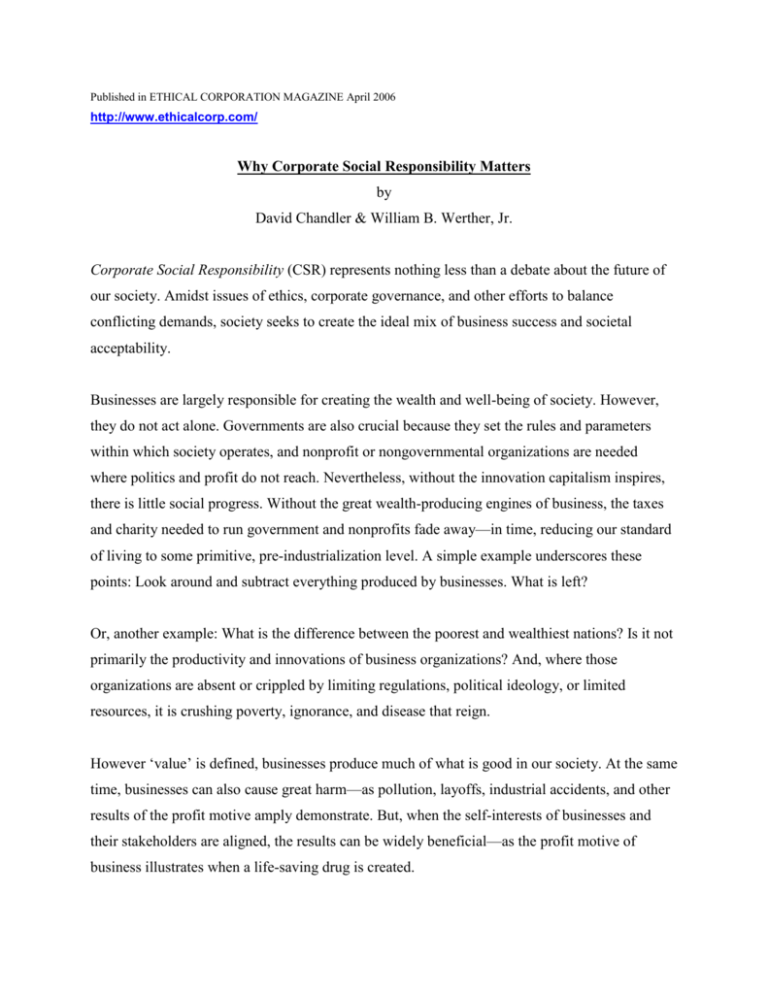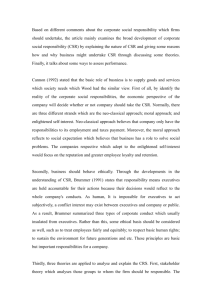
Published in ETHICAL CORPORATION MAGAZINE April 2006
http://www.ethicalcorp.com/
Why Corporate Social Responsibility Matters
by
David Chandler & William B. Werther, Jr.
Corporate Social Responsibility (CSR) represents nothing less than a debate about the future of
our society. Amidst issues of ethics, corporate governance, and other efforts to balance
conflicting demands, society seeks to create the ideal mix of business success and societal
acceptability.
Businesses are largely responsible for creating the wealth and well-being of society. However,
they do not act alone. Governments are also crucial because they set the rules and parameters
within which society operates, and nonprofit or nongovernmental organizations are needed
where politics and profit do not reach. Nevertheless, without the innovation capitalism inspires,
there is little social progress. Without the great wealth-producing engines of business, the taxes
and charity needed to run government and nonprofits fade away—in time, reducing our standard
of living to some primitive, pre-industrialization level. A simple example underscores these
points: Look around and subtract everything produced by businesses. What is left?
Or, another example: What is the difference between the poorest and wealthiest nations? Is it not
primarily the productivity and innovations of business organizations? And, where those
organizations are absent or crippled by limiting regulations, political ideology, or limited
resources, it is crushing poverty, ignorance, and disease that reign.
However ‘value’ is defined, businesses produce much of what is good in our society. At the same
time, businesses can also cause great harm—as pollution, layoffs, industrial accidents, and other
results of the profit motive amply demonstrate. But, when the self-interests of businesses and
their stakeholders are aligned, the results can be widely beneficial—as the profit motive of
business illustrates when a life-saving drug is created.
Why Corporate Social Responsibility Matters
Between the great good and terrible harm business can induce lies an immense concern about the
proper role of corporations in society, particularly as technological innovation expands their
potential. At one extreme, the Nobel Prize winning economist Milton Friedman argues that,
“Few trends could so thoroughly undermine the very foundations of our free society as the
acceptance by corporate officials of a social responsibility other than to make as much money for
their stockholders as possible.” At the other end of the spectrum is a belief system, more firmly
established within the economies of western Europe and Japan, that corporations should act with
greater responsibility toward all their constituents—employees, shareholders, lenders, suppliers,
customers, communities and the wider environment in which they operate. Who is right? Are the
two positions necessarily mutually exclusive?
In our university textbook, Strategic Corporate Social Responsibility, we seek to provide a
framework within which students and general readers alike can answer these questions for
themselves. The purpose of this book is to identify the key issues of CSR and provide a means, a
(re)source, to explore this broad and rapidly-evolving topic of importance to everyone. This
journey of exploration reveals that even the simple answers are colored with gray areas of honest
debate—where reasonable, honorable, and well-intentioned people disagree. And, sometimes
disagree vehemently!
What makes this exploration exciting—besides its relevance to every citizen of planet Earth—is
that CSR is as topical as this morning’s headlines. Jobs and job losses, corruption and scientific
breakthroughs, pollution and medical cures, global warming and technological innovations, all
spring from the relentless drive for innovation and pursuit of profit that we call ‘business.’ And,
when they compete in the marketplace, CSR offers a middle way; a sustainable path between
unbridled capitalism with its mixed consequences on the one hand and rigidly regulated
economies plagued with artificial and stifling limitations on the other.
As we explain in Chapter 3:
CSR exists to address the concerns of stakeholders who are impacted by businesses
pursuing the profit motive. The primary focus of businesses, however, is the pursuit of
2
Why Corporate Social Responsibility Matters
profit—not CSR. What CSR seeks to do is to present business decision makers with a
more balanced view of their operating environment so that decisions are optimized as to
both the ends of profit and the means of execution. And, given the rapidly changing
environments in which these strategies take place, the mix of issues will change for each
firm as it adapts both its strategy and its execution to its turbulent environments. As a
result, it is impossible to prescribe the exact issues any firm is likely to confront. Instead,
we argue that a strategic lens offers the best viewpoint from which to look at CSR.
It is this strategic approach to CSR that we believe offers firms the best means of navigating
today’s turbulent global business environment so that all stakeholders (including shareholders)
benefit over the long term.
Word count: 754
_________________________________________________________
David Chandler (david.chandler@phd.mccombs.utexas.edu) is a Ph.D. student in strategic management
at the University of Texas at Austin. Since graduating with an undergraduate degree in American Studies:
Politics and Government in 1991 (University of Kent, UK), he has divided his time between the United
States, the UK, and Japan, working in the fields of politics, education, and business. He has an MBA from
the University of Miami, Florida and an M.Sc. in East Asian Business from the University of Sheffield in
the UK.
William B. Werther, Jr. (werther@miami.edu) is the Codirector of the Center for Nonprofit
Management at the University of Miami. With 30 years of experience among nonprofit, government, and
business organizations, his expertise is widely sought. Public sector involvement includes work for the
White House Conference on Productivity, the U.S. House of Representatives and NASA. Private sector
work includes Anheuser-Busch, Bell Canada, Citicorp and IBM.
This article is excerpted from Strategic Corporate Social Responsibility: Stakeholders in a Global
Environment (http://www.sagepub.com/werther), by William B. Werther, Jr. & David Chandler. © Sage
Publications, 2006. All rights reserved.
About the book: This university textbook provides faculty and students with a comprehensive, standalone text to support traditional and innovative courses in corporate social responsibility (CSR). Adopting
3
Why Corporate Social Responsibility Matters
a stakeholder approach to CSR, the content and format of this sourcebook defines CSR within the global
communications environment in which multi-national corporations operate today.
4







